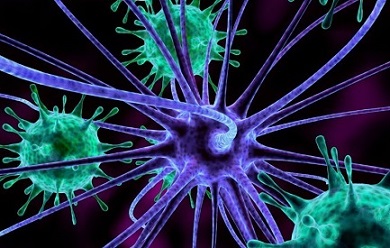Medical News: Respiratory Syncytial Virus (RSV) Infects Nerve Cells Directly And Can Cause A Variety Of Long-Term Neurological Issues!
Nikhil Prasad Fact checked by:Thailand Medical News Team Jan 12, 2024 2 years, 3 weeks, 1 day, 6 hours, 15 minutes ago
Medical News: In the world of infectious diseases, Respiratory Syncytial Virus (RSV) has long been known for its ability to cause respiratory distress, especially in children and the elderly. However, a groundbreaking study conducted by researchers at the Tulane University; New Orleans, Louisiana-USA has uncovered a startling revelation: RSV can directly invade neurons, leading to excessive inflammation and potential long-term neurological risks. This
Medical News report takes a deep dive into the recent findings, exploring the implications of RSV's direct impact on nerve cells and its potential link to neurological disorders.
 RSV Directly Infects Neurons
The Conventional Understanding
RSV Directly Infects Neurons
The Conventional Understanding
RSV, a common respiratory infection, has historically been associated with mild cold-like symptoms in children and severe respiratory illnesses in the elderly. Despite its prevalence, the scientific community had primarily considered RSV as a respiratory pathogen, with its impact limited to the lungs. Recent research challenges this conventional understanding, revealing that RSV's reach extends beyond the respiratory system, infiltrating the nervous system and posing potential long-term risks.
Children and RSV - A Complex Relationship
Up to 90% of children contract RSV in the first two years of life, manifesting as highly contagious mild cold-like symptoms. While previous studies had detected RSV in the cerebrospinal fluid of children with seizures or other neurological symptoms, the cellular mechanisms of RSV's impact on the nervous system remained elusive. The recent study, led by Dr Giovanni Piedimonte, Tulane University; sheds new light on this connection, emphasizing the need to unravel the intricacies of RSV's impact on neurological health.
Research Methodology and Findings
To understand how RSV interacts with nerve cells, researchers utilized three-dimensional peripheral nerve tissue cultures derived from human stem cells and rat embryos. The application of a dye during virus replication allowed scientists to visualize the virus's behavior. Surprisingly, the study revealed that RSV not only infected macrophages, as previously believed, but also directly invaded neurons, initiating a cascade of events leading to excessive inflammation.
Chemokines: The Culprits in Neurological Impact
The researchers observed the release of RSV-induced chemokines during the infection process. Chemokines are critical proteins in the innate immune system that control the migration and positioning of immune cells. In the context of RSV infection, these chemokines play a significant role in triggering inflammation. At lower viral loads, RSV primarily infected macrophages, leading to moderate chemokine release and causing brief peripheral nerve overexcitation. However, higher viral loads resulted in more extensive infections, involving neurons and macrophages, inducing robust chemokine release, loss of neurons and macrophages, and progressive neurotoxicity.
ong>Direct Invasion of Neurons
The most startling revelation from the study was the direct invasion of neurons by RSV. Previously, it was believed that inflammation indirectly activated nerves. However, this study demonstrated that RSV can directly invade nerves, challenging the traditional understanding of the virus's impact on the nervous system. Lead author Giovanni Piedimonte emphasized the significance of this finding, stating that RSV's direct impact on neurons adds a new layer to the importance of RSV vaccines for protecting both infants and the elderly.
RSV and Asthma - A Potential Link
The study hypothesized that transient nerve overexcitation, observed during RSV infection, is more likely chemokine-induced than a result of direct neuron infection. This excessive excitation of respiratory system neurons may contribute to chronic airway hyperreactivity. The recruitment of innate immune effectors via inflammatory chemokines and cytokines could explain why RSV-infected children are more prone to developing asthma later in life. Identifying specific chemokines induced by RSV for neuronal hyperreactivity could pave the way for more precise therapies for conditions like bronchitis, asthma, and chronic obstructive pulmonary disease (COPD).
Peripheral Nerves and the Blood-Brain Barrier
While RSV cannot directly enter spinal cord neurons, the study found evidence suggesting that it can enter the spinal cord via peripheral nerves. Although this mechanism requires further validation through additional research, scientists speculate that using peripheral nerves allows RSV to bypass the blood-brain barrier, potentially entering the central nervous system and infecting the brain. If future studies confirm this, it could signify a significant connection between RSV and other neurological diseases or developmental disorders.
Implications for Public Health
The study's findings carry profound implications for public health, especially considering the reported increase in RSV infections in the United States, the United Kingdom, and Australia during 2023. This surge was attributed to "rebound activity" resulting from the interruption of typical virus activity in the fall and winter seasons due to COVID-19 control measures. As a response to the rising threat, the FDA approved two new RSV preventive tools in mid-2023: nirsevimab for infants and high-risk toddlers, and RSVPreF3 and RSVpreF for adults aged 60 and above. Furthermore, Abrysvo received approval for pregnant women to prevent RSV-related lower respiratory tract diseases in infants.
Conclusion
In conclusion, the recent revelations regarding RSV's direct invasion of nerve cells and its potential to cause long-term neurological issues have opened new avenues for research and intervention. As the medical community gains a deeper understanding of the intricate mechanisms at play, there is hope for more targeted therapies and preventive measures. The approval of new preventive tools signifies a proactive approach to mitigate the impact of RSV on vulnerable populations. As ongoing studies continue to unravel the mysteries of RSV, the ultimate goal is to enhance our ability to safeguard the health of both children and the elderly from the neurological consequences of this seemingly respiratory virus.
The study findings were published in the peer reviewed journal: The Journal of Infectious Diseases.
https://academic.oup.com/jid/advance-article-abstract/doi/10.1093/infdis/jiad596/7492090
For the latest Medical News, keep on logging to Thailand Medical News.
